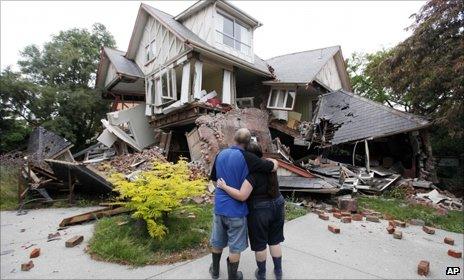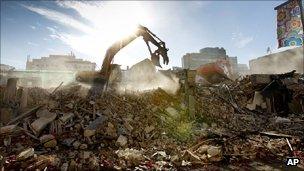Christchurch quake: Life in the condemned red zone
- Published

People may still have to move, even if their home was less badly damaged
Six months after an earthquake killed dozens of people in New Zealand's second largest city, Christchurch, the consequences for thousands more are playing out in slow motion.
It's been a life-changing event, one of those events that forces you to think hard, and make some big decisions.
Six thousand people in Christchurch are living in the so-called red zone, where the land was so badly shaken up the government has decided they must leave.
They don't have to go until 2013 but many have already left. In my street, Avonside Drive, which runs along the Avon river, there are 92 homes. Now there are only 18 families left. I count the lights every evening.
If, like us, you are in the red zone, where do you move to?
Rising prices
Some people want to get away completely and put it all behind them. I know two families that are going to Australia - one has already gone, the other is about to go. They are confident they can get jobs there, so they are just upping and leaving.
Other people are moving to other cities in New Zealand. But my family has chosen to stay put for now, to help out and work through it.
We aim to move to another home in the Christchurch area, but we are faced with some complicated financial choices.
The government will buy the land our house is built on and the insurance company will pay us what it would have cost to repair the house, had we been able to stay here.
But we live on the east side of the city, which was the worst affected and like many other people, we cannot afford to move to the more expensive west.
A lot of people are therefore looking at out-of town locations, but prices there have been rapidly escalating, because of the high demand. We are hoping they will peak, and then fall.
It's been a really stressful time for everyone. The drinking of alcohol has gone up about 10-fold, I can assure you of that. Over-the-counter sales of sleeping pills have also rocketed. Today there were two people in the supermarket having a face-to-face shouting match - you don't often see that. People are tense, like a stretched rubber band.
No insurance

It may be a while before the effect of the quake on business becomes clear
We are really lucky that the New Zealand government is offering to buy so many people out. It's sad for anyone to have to move from the community they always wanted to live in, but if the government had not given this guarantee, we would be a lot worse off.
Economically, the future of the city is unclear. Insurance companies won't issue any new policies until we go two months without a level-four earthquake. We had almost got there until a few days ago, when a few more big shocks came along. A lot of expletives were uttered.
(We have had so much practice, everyone can instantly tell now what level a quake is.)
This is bad for business. The Crowne Plaza hotel, quite a landmark in this part of the city, declared a few days ago that the building would be coming down and would not be rebuilt.
They say they cannot afford to rebuild - there are many costly new technical requirements that have to be followed - and they cannot get a new hotel insured.
Our own home has a few cracks. A lot of windows don't open and close properly, and nor does the front door.
Avonside Drive is now below the level of the river, so where we used to look out on lush greenery we now have a freshly built shingle retaining wall.
This will all become government-owned land. They have not said what they will do with it, but there is speculation that in five or 10 years the land will be fit for development again.
Some people would like to have the option to come back, but there is no sign that they will be given that option.
Weekend repairs
If there has been upside to all this, it has been the community spirit that has arisen. Dozens of new community groups have been formed. Each street has a co-ordinator, who passes information to a committee for that particular suburb.
Ultimately this information is conveyed to the government in Wellington. The same committees also help to gather information, from officials and insurers, and convey it back to street level.
Here is one example of community spirit.
There is a group called Eddington Action, whose members realised there were a number of elderly people in their area, living in houses that were in poor condition even before the quake.
Now, every weekend, builders and volunteers are carrying out repairs to two of these houses - one on Saturday, one on Sunday.
That's a pretty cool result.
Brian Parker is a teacher trainer who works in his spare time for the Canterbury Communities Recovery Network CanCERN - an umbrella group for 40 residents' groups in Christchurch.
- Published21 July 2011